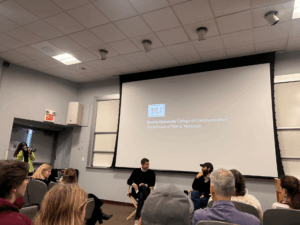Previously incarcerated people would get financial support from cannabis sales
(Somerville Wire) – In a City Council meeting held on August 26, Councilors Will Mbah, Ben Ewen-Campen, and J.T. Scott proposed a resolution that called upon the Mayor’s office to create a restitution program that would help people who were formerly incarcerated due to the war on drugs. The plan is still in its early stages and is intended to specifically reach people of color who have been most impacted. Mbah stated, during that meeting, that the City has “a moral obligation to uphold something like this.” A similar resolution was sponsored by Cambridge City Councilor Quinton Zondervan.
“In addition to and separate from reparations for slavery, Somerville also needs to grapple with its historic and ongoing complicit role in the racist war on drugs that has traumatized thousands of Black and brown residents, and cheated many of their freedom, education, economic prospects, and in some cases their very lives, necessitating both an apology for the harms done and an effort to offer restitution,” reads part of the resolution.
The program, if implemented, would take a to-be-determined percentage of revenue from local cannabis sales and distribute the funds to current and former Somerville residents who have been harmed by the war on drugs, the resolution explains. Mbah stated in an email that following the election in the fall, the sponsors will know more about what the next steps will be. The target launch date is July 22, 2022. The sponsors requested that the Mayor’s Office report back on the progress of the restitution program’s creation by October 4, and they aim to collaborate with the Mayor’s Office on the program.
“This program is necessary to repair the harm that the war on drugs has had on the people it targeted, people of color, and address its lasting impact. The war on drugs served as the successor to explicit discrimination and was designed to disrupt and harm black communities following the end of segregation,” wrote Mbah. “People of color, especially fathers and young men, were targeted in a disproportionate manner because of the color of their skin and had their lives drastically altered. Many victims of the war on drugs became trapped in the criminal injustice system, which ruined their chances of ever benefitting from the economic prosperity all around them. Spending a portion of the tax revenue from cannabis sales is a way to start undoing the harm the war on drugs has caused.”
During the meeting, Councilor Matt McLaughlin raised several concerns. He questioned, what qualifications would a person need to be able to get money, and who would be considered an applicant? He also asked, more specifically, if a person had been incarcerated a long time ago and had only lived in Somerville for a year, would they still be qualified for support? Would the program only be for people who had used or sold cannabis, or would other drugs be included? To process applications, he suggested, it might be necessary to create a new department.
“I think what’s more necessary, what’s more needed, is treating the people who are currently suffering from substance abuse and addiction and people currently caught up in the criminal justice system,” said McLaughlin. “… Restitution is addressing the past problem. While it’s well intentioned, I don’t think it’s the thing I would put money in.” He added, “The big thing we’ve been discussing in Somerville is the consumption site. I would like money put into that. I would like money put into drug rehab programs, which the City has, to date, refused to do. … The biggest gap in our services is the lack of treatment programs for people in the city, for residents. Those are the big things I’d like to see, and then we do have job training programs for people who are getting out of the criminal justice system, through the substance abuse issues. There are a lot of things we can do that are established, that people know.”
Ewen-Campen said that he does not think a new department would have to be created, and he said that he hopes to collaborate with other offices, such as the Office of Racial and Social Justice. He agreed with McLaughlin that no monetary value can be placed on the suffering that so many have experienced, but he also added that many had been unjustly incarcerated, considering that many are now making so much money from the now legal cannabis industry.
“It is absolutely true that there is no dollar amount that can make an unjust incarceration right,” said Ewen-Campen. “But I also think that when we talk about past injustices, we often get stuck in this conversation about an abstract concept, when really, I think that one of the things that is most directly impactful about incarceration is the scarlet letter that it puts on people for the rest of their life—the effect it has, not only in the time when they were incarcerated, but even after, on their ability to make a living, to forge a path forward. That can be a huge challenge, and it can often start a cycle. The point is not necessarily to pretend that we are going to undo what’s been done, but to say, these were unjust laws that our community had a role in enforcing. For people who suffered on that, we can do something to help.”
This article is syndicated by the Somerville Wire municipal news service of the Somerville News Garden project of the Boston Institute for Nonprofit Journalism.
All Somerville Wire articles may be republished by community news outlets free of charge with permission and by larger commercial news outlets for a fee. Republication requests and all other inquiries should be directed to somervillewire@binjonline.org.
SUBSCRIBE TO THE FREE SOMERVILLE WIRE EMAIL NEWSLETTER: https://eepurl.com/hpBYPv
Check out all our social media here: https://linktr.ee/SomervilleWire.
Shira Laucharoen is assistant director of the Boston Institute for Nonprofit Journalism and assistant editor and staff reporter of the Somerville Wire.







